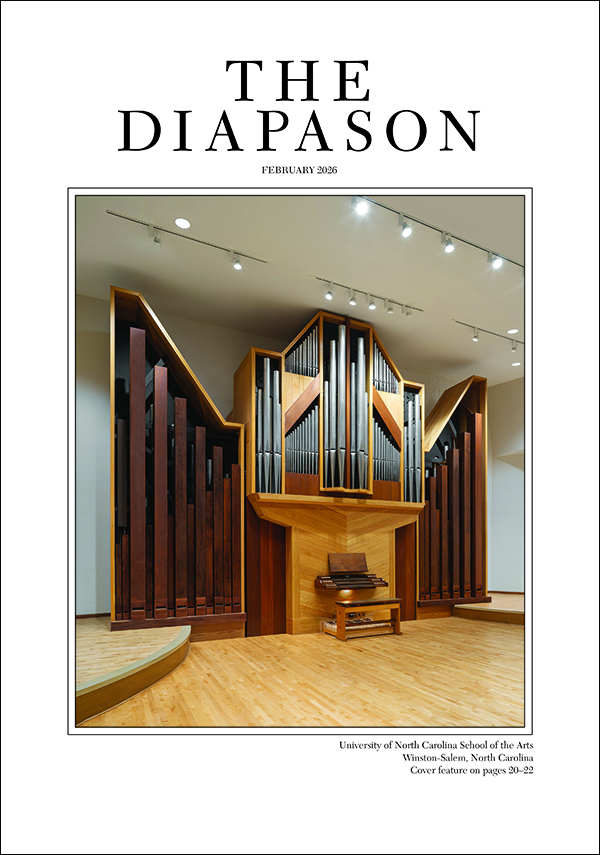
Editor’s note: In 2019, Larry Palmer will celebrate fifty years as harpsichord editor for The Diapason. There is much to celebrate in his work, bringing us insight to this instrument!
Below, Larry presents to us his favorite column from these years, slightly updated, for your reading pleasure.
A letter from Johann Sebastian Bach
To: Professor Larry Palmer
Harpsichord Editor, The Diapason
From: Johann Sebastian Bach
Kk Kapellmeister, Emeritus
Via: SDG Millennial Communications Network (MCN)
Sehr Angesehener Professor Palmer,
I have been meaning to write you for nearly one-third of the past century to tell you how pleased I am that you and your colleagues are concerned with harpsichord matters in your journal The Diapason. It was really quite a shock to many of us up here when the harpsichord came back into fashion, for I had despaired of ever hearing my music properly performed on earth after the decline of my own preferred keyboard instruments. It has been heartwarming (for those, at least, who still have hearts) to note the steady resurgence of the harpsichord, an instrument which, in recent years, is even recognizable.
And the number and variety of performances of my music! I have been prevented from expressing my gratitude to my earthly admirers because of various celestial interventions. It has been a busy century or so here, too, you know (just trying to keep peace between Wanda Landowska and Sylvia Marlowe, each convinced that she plays my music the “right” way, has taxed even eternal patience)! Additionally, the arguments between Arp Schnitger and Aristide Cavaillé-Coll have been constantly entertaining, if a bit time-consuming! At any rate since a rare constellation of opportunity has aligned itself in Heaven, I thought it would be the perfect time since my departure from Earth to communicate through you to my many non-celestial admirers.
It would be lovely if your twenty-first-century players of my music could be a little more concerned with the music and musical communication and less concerned with the minutiae of articulation. Whether the wiggles of a trill go in one direction or another, or, even, whether each accrued fly speck in the score means something, is far less important than the music itself. Surely each player has enough intelligence to decide where an ornament will add something and where it simply gets in the way? (I’ve had to squelch quite a few ideas to the contrary from those organists Widor and Dupré since getting to know them so well here.) And please, stop squabbling about which type of instrument is my preferred one: a well-crafted harpsichord, responsive in action, resonant in sound, satisfies me immensely, as does a finely voiced pipe organ placed in a resonant space, preferably free of carpeting.
I have not come to like the piano any better for my music than I did at the court of King Frederick, and I must say that some strange sounds have wafted up here (what are those little silver plates on which you serve up music?) such as the ones with a well-known pianist playing the solo part of my F-Minor Harpsichord Concerto on his piano, especially since he chose to use a harpsichord as the continuo instrument in his misguided performance? Who comes up with such perverted readings of my music? It took me quite a long time to realize that it even was mine!
I’d like people to know that I don’t expect every performance of my larger works to be complete: cut and paste as necessary, just as I always did for specific performances. After all, my Aria with Diverse Variations, the work you call the Goldberg Variations, was meant to put a nobleman to sleep, night after night (and I gather from distant observation that many performances now manage to do that even for the less-than-aristocratic), so my dear student Goldberg stopped playing when his task was completed, and happily slipped away to enjoy his late-night libation, just as I used to get away during those interminable hour-long sermons at the Thomaskirche so I could warm my hands and drink beer at Zimmermann’s. And what a strange idea to perform all six trio sonatas in one concert! I, too, know they are wonderful pieces (and so modern), but I wouldn’t want to hear all of them in one sitting, nor would I want to hear six of my English or French suites in one concert.
But it is wonderful, and unexpected, to know that so many listeners still want to hear my creations. I am also delighted to see that some of you have been finding my little musical signatures and jokes, with which I was able to keep my mind active. Congratulations, Herr Professor, on noticing my backward signature in the B-flat Prelude from my Well-Tempered Clavier. Keep looking: there are many more finds in store for the observant connoisseur.
And now I must bid you “Auf Wiedersehen!” I want to share some time with my wives and children, and see if our dear friend Isolde Ahlgrimm, who still calls herself the “Widow Bach” to the high dudgeon of both Anna Barbara and Anna Magdalena, would like to join us at our heavenly repast. After that we all have a required celestial computer class to attend, so you may expect more frequent communications from this sphere to yours in the future.
—Your faithful JSB.
[Originally published in The Diapason, July 2000]

